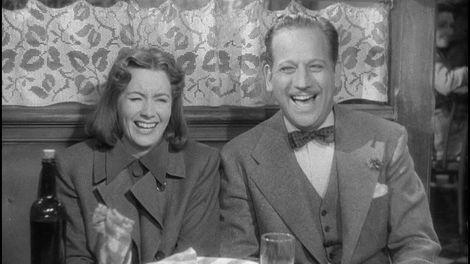It’s fascinating to me that there’s actually a Hitler joke in Ninotchka. Toward the beginning of the movie, the three failed Soviet trade representatives are meeting their replacement at the train station, and they aren’t certain what “he” looks like. They halfheartedly trail a man they suspect of being the right one, and he enthusiastically greets a woman, “Heil Hitler!” They agree that this is definitely not who they were waiting for. This is especially interesting given that the director and at least two members of the cast were of Jewish descent.
The movie is, however, equally scornful of the Soviet system. Iranoff (Sig Ruman), Buljanoff (Felix Bressart), and Kopalski (Alexander Granach) are sent to Paris to sell the fourteen pieces in the fabulous jewel collection of the Grand Duchess Swana (Ina Claire). Who, as it happens, also lives in Paris and is friends with a waiter at the hotel in which the men are staying, inasmuch as said waiter is Count Alexis Rakonin (Gregory Gaye). Swana takes advantage of the situation to send her lover, Count Leon d’Algout (Melvyn Douglas), to distract the envoys. This works until they are removed from authority and a new envoy is sent, the joyless Nina Ivanovna Yakushova (Greta Garbo), nicknamed Ninotchka.
Naturally, before he meets with her as an envoy—she in fact refuses to meet with him as an envoy—Leon encounters Ninotchka on the street. Further naturally, they fall in love. Ninotchka is uncertain she can do her duty to the Soviet people and still be in love with a decadent capitalist aristocrat. Honestly, given that this was under Stalin, she couldn’t—there’s no way she would have survived had knowledge of her affair been made public; we are after all talking about a system that would in years to come send former POWs to the gulags because only collaborators would have failed to have been killed by the Nazis.
Soviet Ninotchka is a dreary, gloomy woman, perfectly suited to a Stalinist society. The way Leon gets through to her in the end is by making her laugh, because free and easy laughter is at least as decadent as the frankly unattractive hat she wears to prove that she’s different now. She factors the cost of the Royal Suite in cows—a cow a day. Is she, she asks, worth so many cows to the Soviet people? And indeed, the way to get her to do her duty is to point out what she can save for those selfsame Soviet people by making a deal that will get the jewels sold more easily and without a great deal of court expenses.
Which I rather like, honestly, because it does prove that Ninotchka doesn’t really surrender everything about herself for love. She genuinely believes the Revolution brings the best possible life for the Soviet people, and is it really her fault that she falls in love with a man who’s such a wastrel that the reason his butler doesn’t want the revolution to come is that he refuses to share half his bank account with his penniless employer? (Or perhaps we should describe him as without a sou; Paris, after all.) Even when she returns to Moscow, she doesn’t wish to spend all her time remembering Paris. She still believes Moscow is wonderful.
I wonder, then, how Ninotchka would have gotten along later in the Stalinist system. The movie makes an awful lot of jokes about really unfortunate subjects—repeatedly, we are reminded that the Soviet people are starving, that there are political show trials, that the price for failure is Siberia at best and likely to be death. Ninotchka was such a pure Soviet idealist that I cannot imagine her going along with Stalinist excesses. Honestly, the fact that she had been an envoy in Paris would itself probably prove problematic for her were she still in Moscow in the late ’40s and early ’50s.
Interesting, too, that Swana explicitly doesn’t care if Leon fools around on her. She knows that he’s using her as a meal ticket. She’s providing him with food and his apartment and all sorts of other things, and if he occasionally fools around with a pretty young thing, well, that’s just how these things go. Claire was eight years older than Douglas, twelve years older than Garbo. That’s not a huge age difference, but it’s enough for a woman to be aware of what she’s facing. Swana is just as interested in protecting that as she is getting her jewels back.
Honestly, though, she’s lucky—there are a lot of movies from the era about aristocrats in various countries wherein the aristocrat lost everything in the Revolution or what have you, and this explicitly isn’t one of those. Swana is not one of those. She still has a maid and a kept man and so forth. She isn’t Count Rakonin, there at the restaurant of a hotel working as a waiter. Heck, we can be pretty sure that Leon isn’t Russian—Russian nobility wouldn’t have the slightest chance of the visa he tries for late in the movie—and he’s surviving by mooching off Swana. Europe between the wars wasn’t a great time and place for most aristocrats, and Swana is doing better than most.
Its lighthearted treatment of its subject matter can fool you into thinking that Ninotchka doesn’t notice such things, beyond the title card at the beginning mentioning that this is before France was at war—it was released just over two months after France declared war on Germany—but there’s really a lot of depth here. And, of course, a lot of quality performances. Though fourth-billed Bela Lugosi is in a grand total of one scene!
This is cross-posted with Movie of the Week in the Dissolve Facebook group!

